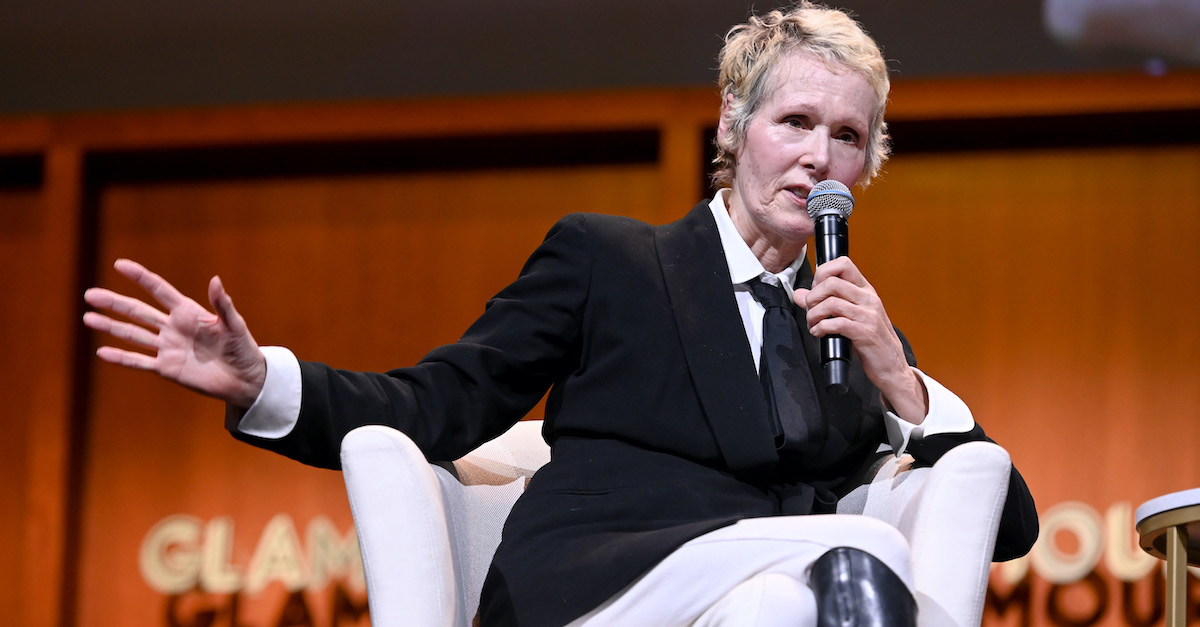
E. Jean Carroll speaks onstage during the How to Write Your Own Life panel at the 2019 Glamour Women Of The Year Summit at Alice Tully Hall on Nov. 10, 2019 in New York City. (Photo by Ilya S. Savenok/Getty Images for Glamour)
Days after a federal appeals court ruled partly in the former president’s favor, Donald Trump’s attorneys have been fighting to put the brakes on a pending lawsuit accusing him of defaming a woman he allegedly raped.
On Friday, attorneys for famed columnist E. Jean Carroll urged a federal judge presiding over that case to keep discovery going in time for Trump’s deposition — revealed for the first time to be scheduled for Oct. 19.
Carroll claims that then-President Trump defamed her though his public denials that he raped her in the dressing room of a Bergdorf Goodman in the 1990s. In one interview with The Hill, Trump told reporters: “She’s not my type.”
Since a federal judge sent the case to discovery, Carroll said that the information sharing has been lopsided, and she claims that Trump wants to hit pause right when he will cough up information.
Trump “seeks to unilaterally reap the benefits of discovery by invoking an appeal that has been pending for twenty months,” Carroll’s attorney Roberta Kaplan wrote in the five-page letter, emphasizing the sentence in boldface and underlined text.
Over the past four months, Carroll says, Trump obtained 30,469 pages of records from her, hundreds more through subpoenas to non-parties, 19 substantive interrogatory responses, and deposed a key witness.
In return, however, the former president produced “just eight documents and four incomplete interrogatory responses” and “otherwise stonewalled every document request and interrogatory,” according to the letter.
“Now that Defendant has benefited substantially from a discovery process that he actively set in motion — and now that he faces the prospect of his own deposition, having stonewalled every other discovery mechanism — he suddenly says that the continued pendency of a ‘case-dispositive’ appeal changes everything,” the letter says, adding a one-word response: “Nonsense.”
Earlier this week, a divided Second Circuit found that Trump qualified as a government “employee” under the Westfall Act, a key argument required for substituting the government for him as a defendant in Carroll’s lawsuit.
The Department of Justice, under both Bill Barr and Merrick Garland’s stewardship, has taken the position that Trump is immune from liability for statements that he made as president. Two out of three judges of the Second Circuit stopped just short of endorsing that proposition, sending the question to the D.C. Court of Appeals.
Carroll’s lawyers say that the appellate court left the matter too unresolved for Trump to benefit from the ruling.
“The Second Circuit’s ruling changed hardly anything: it left open the ultimate question that has been on appeal for twenty months—namely, whether the United States should have been substituted for Defendant,” the letter states. “Defendant initiated discovery while the scope-of-employment question was on appeal, he sought to add a counterclaim while it was on appeal, and he obtained documents and testimony while it was on appeal. He should not be permitted to assert at the last minute that he is entitled to avoid a deposition because it remains on appeal.”
Trump’s attorney Alina Habba, seeking the stay, articulated a vastly different interpretation about the breadth of the appellate court’s ruling.
“By virtue of the Second Circuit’s Decision, the United States must be substituted as the defendant in the instant action pending resolution of the proceedings before the D.C. Court of Appeals,” she wrote.
Hitting pause on the litigation at this point, Carroll’s team says, will also throw a wrench in another lawsuit they intend to file against the former president later this year.
“The impracticality of cutting off discovery now that Defendant finally faces the prospect of satisfying his discovery obligations is only heightened by one more consideration: the relevance of the discovery here to the Adult Survivors Act case that Plaintiff will file in November,” the letter states.
Though the pending case is for defamation case, the Adult Survivors Act opened the window to sue over allegations of sexual abuse that otherwise would have been barred by the statute of limitations.
“The underlying dispute in both cases encompasses a single core disagreement — did Defendant sexually assault Plaintiff — and Defendant will have to testify under oath about his actions either way,” the letter states. “To assuage concerns about duplicative discovery, and to the extent it wasn’t already clear, Plaintiff agrees that any depositions in the present action may be used for Plaintiff’s forthcoming action, thereby promoting efficiency and obviating the need for do-overs.”
The case is pending before U.S. District Judge Lewis Kaplan, who in the past has slammed Trump’s attorneys for what he has described as delay tactics. Carroll’s lawyers say that the same strategy remains at play.
“This case began on November 4, 2019, and it could hardly be clearer that Defendant hopes to ‘run out the clock’ until he is elected president again,” the letter states.
By press time, the court did not issue a ruling.
Read the letter, below: